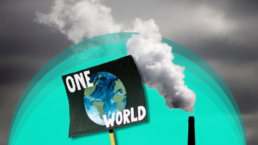This is not simply a rich versus poor countries divide: there are huge emitters in poor countries, and low emitters in rich countries
By Lucas Chancel, The Guardian
Let’s face it: our chances of staying under a 2C increase in global temperature are not looking good. If we continue business as usual, the world is on track to heat up by 3C at least by the end of this century. At current global emissions rates, the carbon budget that we have left if we are to stay under 1.5C will be depleted in six years. The paradox is that, globally, popular support for climate action has never been so strong. According to a recent United Nations poll, the vast majority of people around the world sees climate change as a global emergency. So, what have we got wrong so far?

There is a fundamental problem in contemporary discussion of climate policy: it rarely acknowledges inequality. Poorer households, which are low CO2 emitters, rightly anticipate that climate policies will limit their purchasing power. In return, policymakers fear a political backlash should they demand faster climate action. The problem with this vicious circle is that it has lost us a lot of time. The good news is that we can end it.
Let’s first look at the facts: 10% of the world’s population are responsible for about half of all greenhouse gas emissions, while the bottom half of the world contributes just 12% of all emissions. This is not simply a rich versus poor countries divide: there are huge emitters in poor countries, and low emitters in rich countries.
Consider the US, for instance. Every year, the poorest 50% of the US population emit about 10 tonnes of CO2 per person, while the richest 10% emit 75 tonnes per person. That is a gap of more than seven to one. Similarly, in Europe, the poorest half emits about five tonnes per person, while the richest 10% emit about 30 tonnes – a gap of six to one. (You can now view this data on the World Inequality Database.)
Recent Posts
“Arrest Now, Ask Questions Later”: Why Did L.A. ICE Agents Arrest and Jail U.S. Citizen Andrea Velez?
July 3, 2025
Take Action Now “They didn’t have vests that said ICE or anything. Their cars didn’t have license plates. … Just because of the color of our…
Trump’s Big, Beautiful Bill Is Naked Class War
July 3, 2025
Take Action Now Trump’s “Big, Beautiful Bill” trades tax cuts on millionaires for the dissolution of society.By Hamilton Nolan, In These Times…
Mayor Mamdani’s First Day, A Zero Hour Conversation With Richard Wolff
July 2, 2025
Take Action Now If elected, what would Mayor Mamdani do on his first day in City Hall? How would a democratic socialist govern as a big-city mayor?……
The U.S. Is Funding A Bloodbath At Gaza Aid Centers
July 2, 2025
Take Action Now The admin just gave $30M to GHF, the organization at the center of charges that Israel is weaponizing assistance and shooting at…




